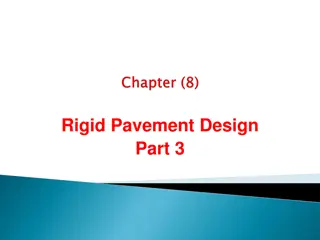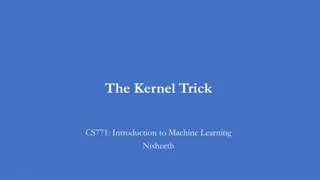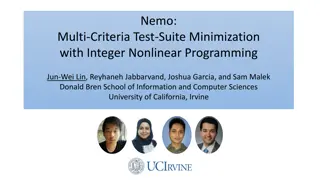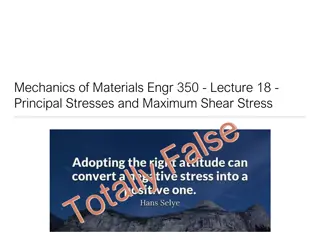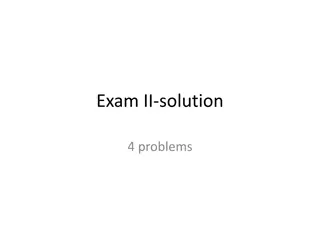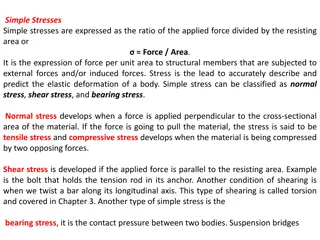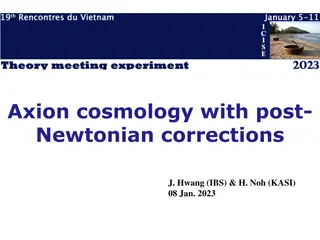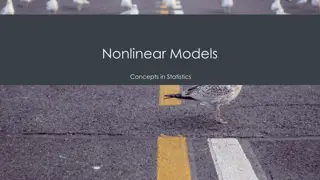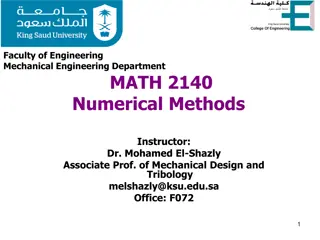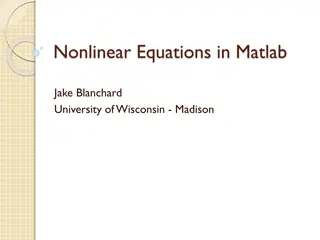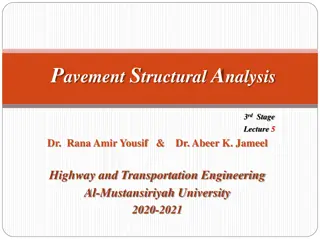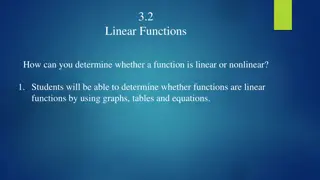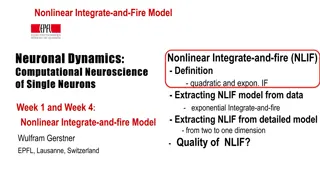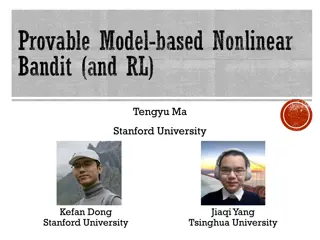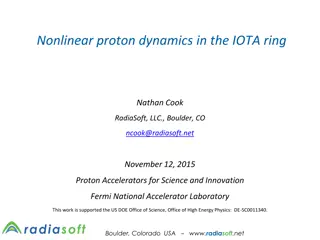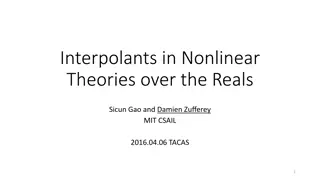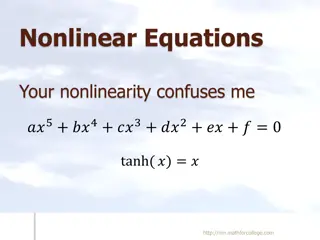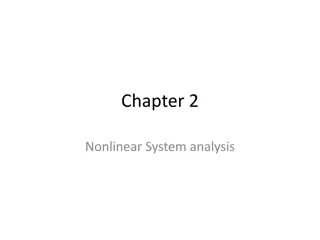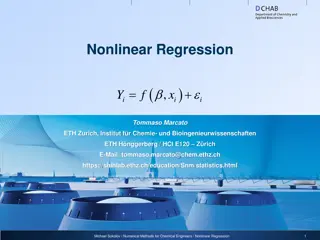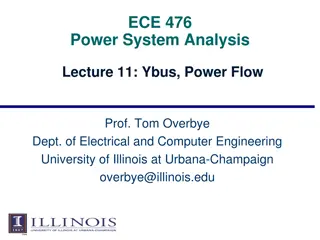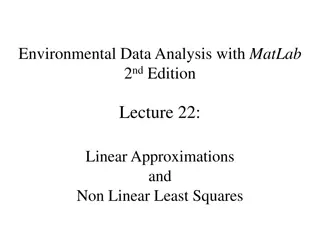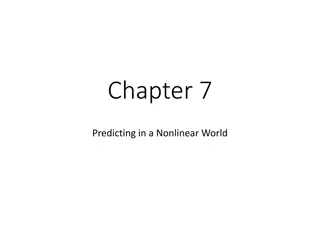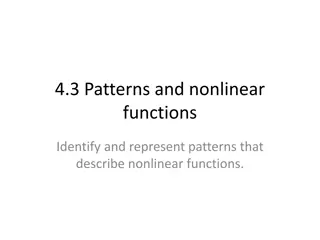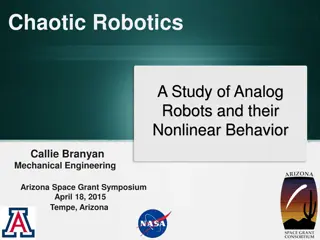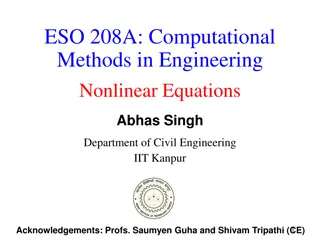Rigid Pavement Design: Stresses and Joint Types
Stresses due to temperature variation can affect concrete slabs, causing warping and friction stresses. Proper joint design, including expansion, contraction, and construction joints, is crucial to minimize stress and prevent warping in concrete pavements. This guide explores different types of join
4 views • 9 slides
Nonlinear Relationships in Econometrics
Discover the complexities of nonlinear relationships through polynomials, dummy variables, and interactions between continuous variables in econometrics. Delve into cost and product curves, average and marginal cost curves, and their implications in economic analysis. Understand the application of d
3 views • 34 slides
Hoop Stresses and Principal Stresses in Thin Cylindrical Shells
Explanation of principal planes and stresses in thin cylindrical shells, defining concepts such as principal planes, principal stresses, major principal stress, minor principal stress, major principal plane, and minor principal plane. Detailed explanation of hoop stress (circumferential stress) and
1 views • 8 slides
The Power of Nonlinear Models in Machine Learning
Delve into the limitations of linear models for handling nonlinear patterns in machine learning. Explore how nonlinear problems can be effectively addressed by mapping inputs to higher-dimensional spaces, enabling linear models to make accurate predictions. Discover the significance of feature mappi
2 views • 15 slides
Multi-Criteria Test Suite Minimization with Integer Nonlinear Programming
The study introduces a method for minimizing test suites using Integer Nonlinear Programming. It addresses regression testing challenges, such as managing large numbers of test cases, through Multi-Criteria Test Suite Minimization (MCTSM). The research explores the application of Integer Programming
3 views • 34 slides
Principal Stresses in Mechanics of Materials
In this lecture, we delve into the concept of principal stresses and how to determine the orientation of principal planes. We explore methods to find principal stress orientations and discuss the significance of principal stresses in materials. The content includes detailed equations, diagrams, and
0 views • 16 slides
Structural Engineering Solutions: Moments, Stresses, and Centroids
An in-depth analysis of structural engineering problems involving centroids, moments of inertia, maximum stresses, and curvature calculations. Solutions are provided for scenarios such as the application of couples to machine parts and wooden beams, determining maximum tensile and compressive stress
0 views • 12 slides
Simple Stresses in Structural Engineering
Simple stresses play a crucial role in structural analysis by determining the force per unit area on structural members. Normal, shear, and bearing stresses are key classifications that describe the behavior of materials under external forces. This article delves into the concepts of simple stresses
3 views • 18 slides
Axion Cosmology with Post-Newtonian Corrections
Exploring axion cosmology with post-Newtonian corrections, this study delves into linear density perturbations for dust, the role of axion as a cold dark matter candidate, and fully nonlinear perturbation formulations. It addresses continuity, momentum conservation, and quantum stress to identify ke
0 views • 22 slides
Nonlinear Models in Statistics
Nonlinear models in statistics focus on exploring nonlinear relationships between quantitative variables. This involves defining exponential growth and decay, analyzing population data trends like the dramatic turnaround of bald eagles after the ban on DDT, and determining when linear models may not
1 views • 21 slides
Nonlinear Curve Fitting Techniques in Engineering
Utilizing nonlinear curve fitting techniques is crucial in engineering to analyze data relationships that are not linear. This involves transforming nonlinear equations into linear form for regression analysis, as demonstrated in examples and methods such as polynomial interpolation and exponential
0 views • 18 slides
Solving Nonlinear Equations in Matlab: A Comprehensive Guide
Explore the process of solving nonlinear algebraic equations using fzero and fsolve commands in Matlab. Understand the potential for no solution or multiple solutions, and learn how to convert equations into functions, define the functions, call the solver, and run the full code to find the roots of
0 views • 9 slides
Neural Network Control for Seismometer Temperature Stabilization
Utilizing neural networks, this project aims to enhance seismometer temperature stabilization by implementing nonlinear control to address system nonlinearities. The goal is to improve control performance, decrease overshoot, and allow adaptability to unpredictable parameters. The implementation of
0 views • 24 slides
Nonlinear Analysis of Pavement Structural Stresses and Deflections
Explore the effect of nonlinearity in granular materials on vertical stresses and deflections in pavement structural analysis. Learn about iterative methods and stress invariants to understand pavement behavior under traffic loads. Discover the application of Boussinesq's solutions and Burmister's l
0 views • 20 slides
Determining Linearity of Functions Through Graphs, Tables, and Equations
Students learn to distinguish between linear and nonlinear functions by examining graphs, tables, and equations. Linear functions exhibit constant rates of change, represented by straight lines, while nonlinear functions lack a constant rate of change, leading to curved or non-linear graph shapes. B
0 views • 11 slides
Nonlinear Integrate-and-Fire Models in Neuronal Dynamics
Exploring the Nonlinear Integrate-and-Fire (NLIF) model in computational neuroscience, including its definition, the quadratic and exponential IF variations, and methods for extracting NLIF models from data and detailed neuronal models. Gain insights into the complex dynamics of single neurons throu
0 views • 32 slides
Challenges in Model-Based Nonlinear Bandit and Reinforcement Learning
Delving into advanced topics of provable model-based nonlinear bandit and reinforcement learning, this content explores theories, complexities, and state-of-the-art analyses in deep reinforcement learning and neural net approximation. It highlights the difficulty of statistical learning with even on
0 views • 23 slides
Nonlinear Proton Dynamics in the IOTA Ring: Advancements in Beam Acceleration
Probing the frontier of proton acceleration, this research delves into nonlinear dynamics within the IOTA ring, showcasing integrable optics and innovative technologies. Collaborations with Fermilab drive advancements in accelerator science, supported by the US DOE. The study explores variational as
2 views • 21 slides
Interpolants in Nonlinear Theories: A Study in Real Numbers
Explore the application of interpolants in nonlinear theories over the real numbers, delving into topics such as reasoning about continuous formulae, Craig interpolation, and branch-and-prune strategies. Discover how nonlinear theories can be both undecidable and decidable with perturbations, captur
0 views • 20 slides
Solving Nonlinear Equations in Engineering Problems
Explore practical applications of solving nonlinear equations in engineering scenarios, including finding submersion depth of floating balls, determining fluid temperatures, and calculating mast height for structural stability. Engage with examples and visuals to enhance your understanding of nonlin
0 views • 38 slides
Nonlinear Optical Processes in Semiconductors
Exploring the complexities of nonlinear optics in the perturbative and non-perturbative regimes, this research delves into the generation of harmonics, optical Kerr effects, and extreme nonlinear optical phenomena utilizing phase-controlled electromagnetic pulses. The work also investigates the inte
1 views • 15 slides
Linear and Nonlinear Functions in Mathematics
Explore the concepts of linear and nonlinear functions in mathematics through identifying linear and nonlinear functions from graphs, understanding the characteristics of linear functions, and identifying linear functions from tables. Learn about the constant rate of change, slope, and how to determ
0 views • 49 slides
Chloroprene Rubber Compression Test Using COMSOL
Elastomers and biological materials exhibit strain rate dependent mechanical behavior and hysteresis when subjected to cyclical loads. This example demonstrates the use of the Polymer Viscoplasticity feature in the Nonlinear Structural Materials Module for modeling such phenomena using the Bergstrom
0 views • 8 slides
Nonlinear Regression in Chemical Kinetics Analysis
Nonlinear regression plays a crucial role in analyzing chemical kinetics, as seen in the application of the Michaelis-Menten model to Puromycin kinetics. The process involves modeling enzyme reaction velocities, linearizing the model for regression analysis, and deriving insights for further analysi
0 views • 23 slides
Understanding Nonlinear Media Propagation
Explore the microscopic description of nonlinearity in nonlinear media, including anharmonic oscillators and Lorentz force effects. See how strong incident linearly polarized fields affect electron trajectories and discover the equations governing displacements in x and z directions in a simple case
0 views • 67 slides
Understanding Residual Stresses in Weld Joints
Learn about the definition of residual stresses, their development in welding, mechanisms behind their formation, and how they impact engineering components. Discover the factors influencing residual stresses and their implications for structural integrity.
0 views • 14 slides
Ultrafast Nonlinear Optics High Harmonic Generation Project
Explore the project on high harmonic generation in ultrfast nonlinear optics, aiming for 5th harmonic generation using the Kansas Light Source laser. Learn about harmonic frequencies, design components like Barium Borate and Argon Gas, and achieve a 3rd harmonic light with 5% power conversion effici
0 views • 6 slides
Understanding Linear and Nonlinear Oscillators in Classical Mechanics
Explore the concepts of linear and nonlinear oscillators, derivatives, differential equations, and harmonic oscillators in classical mechanics and electromagnetism. Learn about the linearization of differential equations, Taylor expansion of forces, and methods of solving harmonic oscillators. Dive
0 views • 12 slides
Nonlinear System Analysis: Phase Plane Methods & Existence Conditions
Explore the analysis of nonlinear systems using phase plane methods, Describing Function Method, and the conditions for the existence of solutions. Learn about Phase Plane Analysis, Global Lipschitz Condition, and more in the context of second-order systems.
0 views • 20 slides
Enhanced Steady-State Simulation of Nonlinear Integrated Microelectronic Devices and Circuits
Explore the enhanced steady-state simulation of nonlinear devices and circuits in this undergraduate research project. Learn about modified nodal analysis, nonlinear device models, and numerical results for efficient electronic design simulation and automation.
0 views • 18 slides
Nonlinear Regression Methods for Chemical Engineers
Explore nonlinear regression techniques in chemical engineering, focusing on the Michaelis-Menten model and its application to enzyme kinetics. Learn about linearization, model fitting, and regression analysis with practical examples and visualizations.
0 views • 23 slides
Power System Analysis and Linear/Nonlinear Elements Overview
Learn about power flow analysis, linear vs. nonlinear systems, linear and nonlinear power system elements, and the challenges of solving nonlinear problems in power systems. Understand how linear elements can be analyzed using superposition, while nonlinear elements require iterative approaches. Exp
0 views • 32 slides
Impact of Tx EVM on MIMO Detection in WLAN Systems
Explore the impact of transmit error vector magnitude (Tx EVM) on MIMO detection in wireless systems, specifically WLAN. Understand the challenges of nonlinear detection in the presence of RF impairments and how it affects performance compared to linear detection. Discover the expected gains of a no
0 views • 9 slides
Environmental Data Analysis: Linear Approximations and Nonlinear Least Squares
Explore the application of linear approximations to error estimation and least squares in environmental data analysis. Learn how to make linear approximations of nonlinear functions and apply them effectively. Dive into polynomial approximations and Taylor series to enhance your understanding of dat
0 views • 53 slides
Predicting in a Nonlinear World: Understanding Model Relationships
Explore the concept of predicting in a nonlinear world and learn how to get the model right by articulating what it means to accurately represent the relationship between variables. Discover transformations to improve model specification and how to test for nonlinearities in econometric models.
0 views • 22 slides
Understanding Nonlinear Functions and Patterns in Mathematics
Discover and analyze patterns in nonlinear functions, interpreting graphs of linear and nonlinear functions, and writing rules to describe nonlinear functions. Explore relationships between variables in various mathematical contexts with practical examples and visual representations.
0 views • 9 slides
Exploring Analog Robotics and Nonlinear Behavior in Chaotic Robotics Study
Dive into the world of analog robotics and nonlinear behavior with a study on chaotic robotics by Callie Branyan. The research aims to develop an analog circuit showcasing nonlinear behavior for enhanced performance over digital counterparts and creating more resilient robots for autonomous explorat
0 views • 14 slides
Computational Methods in Engineering: Nonlinear Equations Analysis
Explore the world of nonlinear equations in engineering through methods like Graphical, Bracketing, and Bisection methods. Understand the principles behind finding roots of nonlinear equations efficiently.
0 views • 14 slides
Exploring Patterns and Nonlinear Functions
Discover the concept of nonlinear functions through classifying functions as linear or nonlinear based on different scenarios and graphs, and determine linearity with given data points. Gain insights into how functions behave and understand their graphical representations.
0 views • 6 slides
Understanding Patterns and Nonlinear Functions
Explore the classification of functions as linear or nonlinear, representation of patterns, and writing rules for describing nonlinear functions in this educational content. Graphs and tables are used to illustrate concepts effectively.
0 views • 8 slides
